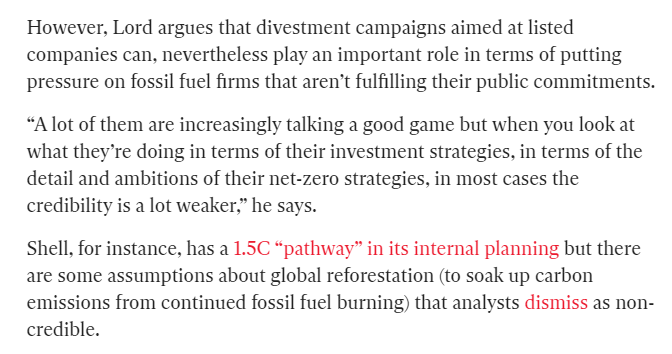
Does trying to defund fossil fuel companies make economic and environmental sense?
🏭💸🔨🌎
A thread…🧵1/14
🏭💸🔨🌎
A thread…🧵1/14
Extinction Rebellion has been exerting pressure on banks over their financing of fossil fuel companies.
Asset managers have come under increasing pressure to sell shares in these firms too...2/
independent.co.uk/climate-change…
Asset managers have come under increasing pressure to sell shares in these firms too...2/
independent.co.uk/climate-change…
Some argue such financial divestment campaigns are foolish and counterproductive.
Bill Gates claims they haven’t done any good...3/
ft.com/content/21009e…
Bill Gates claims they haven’t done any good...3/
ft.com/content/21009e…
Paul Johnson of the IFS says it unhelpfully confuses the issue for the public...4/
https://twitter.com/PJTheEconomist/status/1397108521980866561?s=20
Another view is that divesting listed firms will merely create new opportunities for state-owned oil and gas companies...5/
theconversation.com/fossil-fuel-di…
theconversation.com/fossil-fuel-di…
So is there anything to be said for divestment campaigns?
Well, clearly the biggest effort must come on the demand side of the equation.
We need to switch to zero carbon fuels & this will require government regulation, investment, carbon taxes, behaviour change etc...6/
Well, clearly the biggest effort must come on the demand side of the equation.
We need to switch to zero carbon fuels & this will require government regulation, investment, carbon taxes, behaviour change etc...6/
If we divested listed fossil fuel firms but didn't change consumption patterns then, yes, state-owned ones would likely fill the gap with no benefit to the fight against global warming.
But does that mean we should simply ignore the supply side?...7/
oilprice.com/Energy/Crude-O…
But does that mean we should simply ignore the supply side?...7/
oilprice.com/Energy/Crude-O…
Arguably not.
Fossil fuel companies are big reservoirs of engineering expertise which could be vital in assisting the zero-carbon transition.
If they're not seriously about net zero (as many aren’t, despite their rhetoric, as @timbolord points out) that’s a problem...8/
Fossil fuel companies are big reservoirs of engineering expertise which could be vital in assisting the zero-carbon transition.
If they're not seriously about net zero (as many aren’t, despite their rhetoric, as @timbolord points out) that’s a problem...8/

And activism and divestment campaigns can arguably incentivise corporate change.
Denmark’s Orsted has successfully transformed itself from a fossil fuels company to a renewables firm.
Could divestment pressure not persuade others to follow suite?...9/
poweringpastcoal.org/insights/econo…
Denmark’s Orsted has successfully transformed itself from a fossil fuels company to a renewables firm.
Could divestment pressure not persuade others to follow suite?...9/
poweringpastcoal.org/insights/econo…
This leads to another justification for divestment – it’s in the interests of shareholders.
Imperial College researchers have shown the shares of fossil fuel firms are up by 57% over the past decade, versus 423% growth for renewables firms...10/
imperialcollegelondon.app.box.com/s/73em3ob3h1pu…
Imperial College researchers have shown the shares of fossil fuel firms are up by 57% over the past decade, versus 423% growth for renewables firms...10/
imperialcollegelondon.app.box.com/s/73em3ob3h1pu…

Exxon was demoted from the Dow Jones index last year due to its sliding valuation...11/
bloomberg.com/news/articles/…
bloomberg.com/news/articles/…
...For @CampanaleMark of @CarbonBubble the case for divestment is less about putting pressure on fossil fuel boards than persuading investors and banks where their own long-term financial self-interest really lies...12/ 

...Now free market fundamentalists will probably scoff at the idea activists might know better than investors and bank executives about their long-term financial self-interest.
Non-free market fundamentalists might have more time for it...13/
Non-free market fundamentalists might have more time for it...13/
Leaving that debate aside, there’s a danger of being purist on the divestment issue & assuming net zero is *only* about crushing fossil fuel demand.
Perhaps as a society we can walk and chew gum at the same time?
More here for @indy_climate 👇
ENDS
independent.co.uk/climate-change…
Perhaps as a society we can walk and chew gum at the same time?
More here for @indy_climate 👇
ENDS
independent.co.uk/climate-change…
• • •
Missing some Tweet in this thread? You can try to
force a refresh











